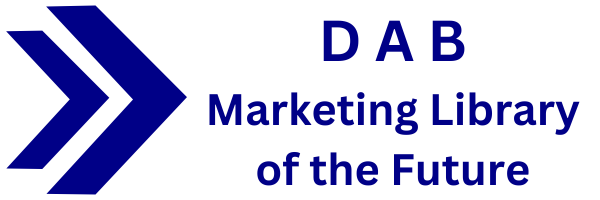
- Best for managing volunteers and events: Pipedrive
- Best for omnichannel marketing: Zoho CRM
- Best for tracking donor behavior with data insights: Virtuous
- Best nonprofit CRM tool with integrations: HubSpot
- Best white label CRM for nonprofits: Bitrix24
- Best for nonprofit project management: monday sales CRM
CRM software used within the nonprofit sector typically helps organizations manage and grow their relationships with donors, organize outreach and track activities. The use of a CRM tool for a nonprofit organization of any size can improve productivity and create a streamlined process for them to market to donors, track revenue and progress to goals.
2
Salesforce CRM
Employees per Company Size
Micro (0-49), Small (50-249), Medium (250-999), Large (1,000-4,999), Enterprise (5,000+)
Any Company Size
Any Company Size
Features
Calendar, Collaboration Tools, Contact Management, and more
3
HubSpot CRM
Employees per Company Size
Micro (0-49), Small (50-249), Medium (250-999), Large (1,000-4,999), Enterprise (5,000+)
Micro (0-49 Employees), Small (50-249 Employees), Medium (250-999 Employees), Large (1,000-4,999 Employees)
Micro, Small, Medium, Large
Top nonprofit CRM software comparison
The top general CRM providers offer a range of marketing, sales and support solutions. Those core features can be used by nonprofits as well. Some notable features nonprofits might prioritize include donor (lead) management, payment and revenue management and a mobile app for field selling or canvassing.
Our list of top options include popular providers like Pipedrive, HubSpot and Zoho CRM, as well as some industry-specific platforms like Virtuous. Each option can be implemented into the business of a nonprofit based on exact need, scalability and budget. It’s also normal for some providers to offer discounted rates or even free versions of their tool to nonprofits that apply for their discount programs.
| Software | Donor management | Payment/ invoice tracking | Mobile app | Native and third-party integrations | Pricing* |
|---|---|---|---|---|---|
| Pipedrive | Yes | Limited | iOS and Android | 400+ | $14.90 per user per month |
| Zoho CRM | Yes | Through integrations | iOS and Android | 800+ | Free starting price |
| Virtuous | Yes | Yes | iOS and Android | 100 | Contact for quote |
| HubSpot | Yes | Yes | iOS and Android | 1,500+ | Free starting price |
| Bitrix24 | Yes | Through integrations | iOS and Android | 600+ | Free starting price |
| monday sales CRM | Yes | Through integrations | iOS and Android | 200+ | $12 per user per month |
*Price when billed annually.
Pipedrive: Best for managing volunteers and events
Our star rating: 4.3/5
 Image: Pipedrive
Image: Pipedrive
Pipedrive’s CRM platform allows nonprofits to streamline their operations by keeping track of donor activity, events and volunteers. Users can create multiple workflows and automations to track the efficiency of marketing campaigns, estimate fundraising potential and nurture long-term supporters for the organization.
Users can maintain a database of current and former volunteers with custom fields to track events. The platform works as a volunteer management platform by streamlining volunteer communications as well as capturing signups from new donors and logging touchpoints at events.
Pricing
- Essential: $14.90 per user per month, billed annually, or $21.90 per user when billed monthly. Users can receive access to lead and deal management tools, product catalog, API access, email inbox and activity reports.
- Advanced: $27.90 per user per month, billed annually, or $37.90 per user when billed monthly. This plan includes all Essential offerings, plus revenue reports, live chat support during business hours, smart contact data and more.
- Professional: $49.90 per user per month, billed annually, or $59.90 per user when billed monthly. In addition to all Advanced features, this tier includes automatic assignments, contacts timeline, formula fields and more.
- Power: $64.90 per user per month, billed annually, or $74.90 per user when billed monthly. The Power plan includes all Professional offerings, as well as free project add-ons, 24/7 live chat and phone support, 500 custom fields and more.
- Enterprise: $99.00 per user per month, billed annually, or $119 per user when billed monthly. This plan offers all Power features plus unlimited open deals, custom fields, insights reports, security alerts and more.
Features
- Goal tracking: Maintain progress toward goals with concrete and detailed reporting. Create goals based on deals or activities and track them by adding pipelines, durations and assignees.
- Activities management: View individual or team calendars, manage activities like follow-up emails, phone calls or meetings, and plan schedules efficiently.
- Email inbox: Create group emails from templates and handle email scheduling, tracking and syncing with Pipedrive’s email inbox.
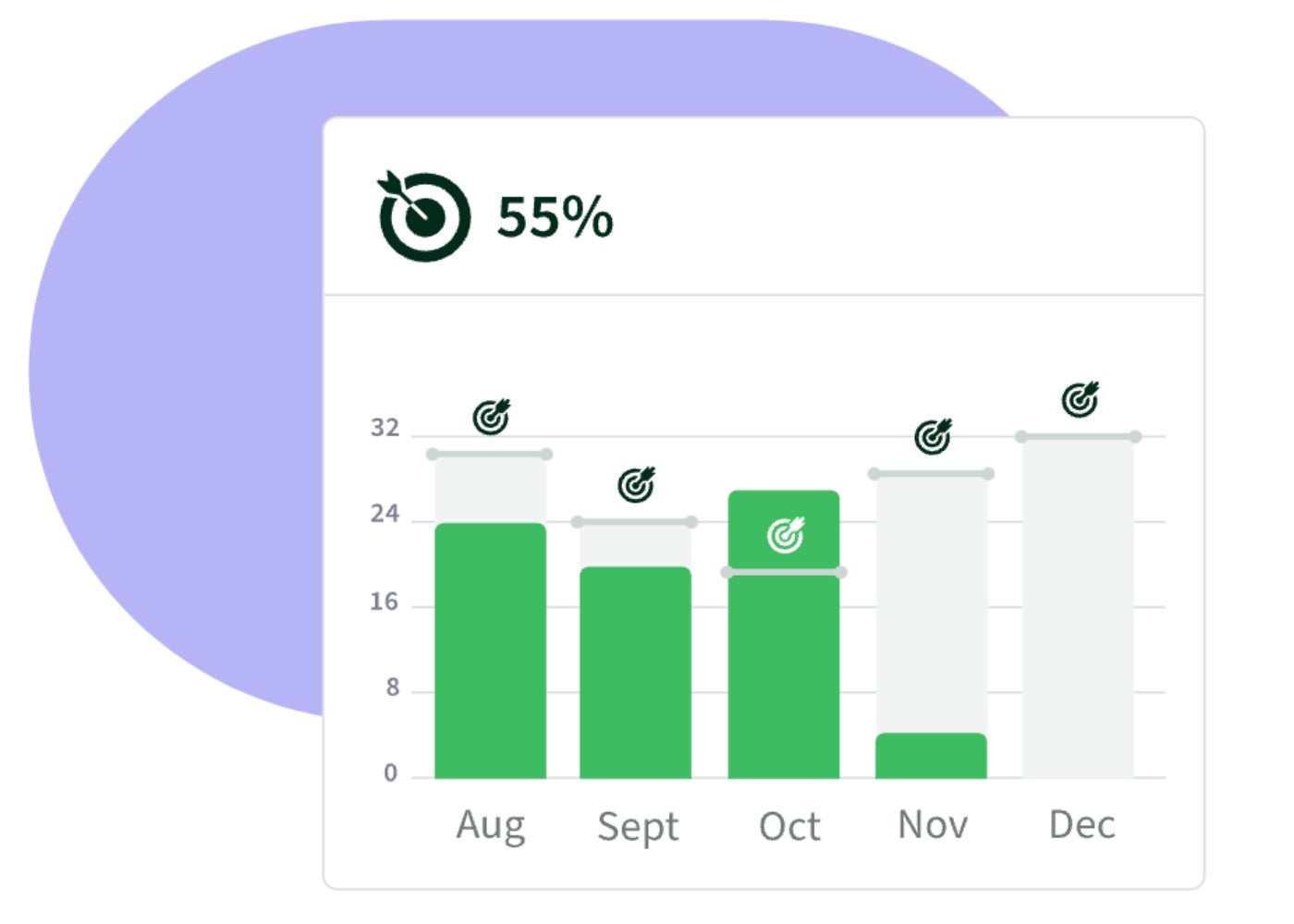 Figure A: Goal tracking dashboard view. Image: Pipedrive
Figure A: Goal tracking dashboard view. Image: Pipedrive
Pipedrive pros and cons
| Pros | Cons |
|---|---|
| 14-day free trial. | Doesn’t provide a free version of the CRM tool. |
| User reports of simple pipeline UX/UI. | Limited customization options for reporting tools. |
| 24/7 customer support. | Limited email tools, such as group emailing or scheduling, in the Essential tier. |
Why we chose Pipedrive
Pipedrive is a CRM tool that focuses on automating sales processes with visual pipelines for businesses to easily manage leads and deals. In addition to its intuitive interface, Pipedrive offers instant sales insights through precise, real-time data analytics. These reports can assist in monitoring sales performance and forecasting and tracking revenue or donations. Pipedrive has pricing plans designed for small to mid-sized businesses on the rise.
While Pipedrive’s premium plans are competitively priced, there isn’t a free option for smaller nonprofits looking for a basic no-cost tool. If that’s the case for you, consider looking into HubSpot for its robust free CRM.
To learn more about this provider, check out our Pipedrive review.
Zoho CRM: Best for omnichannel marketing
Our star rating: 4.3/5
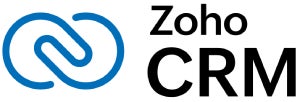 Image: Zoho CRM
Image: Zoho CRM
Zoho CRM offers an omnichannel approach to marketing, so organizations can be present and active on social media, chat, telephone, email and SMS platforms to create visibility. Users can share their progress, conduct polls, respond to questions and learn what resonates most with potential donors, volunteers and other stakeholders.
These outreach strategies identify not only potential donors but also local supporters and volunteers. After targeting these potential stakeholders, users can engage with them through customized email templates and behavior and trigger-based autoresponders.
Pricing
- Free CRM: Free for up to three users and comes with lead and document management and a mobile app.
- Standard: $14 per user per month, billed annually, or $20 per user when billed monthly. This plan provides basic modules, multiple pipelines, sales forecasting and more.
- Professional: $23 per user per month, billed annually, or $35 per user when billed monthly. This tier offers all Standard features, plus assignment rules, unlimited custom reports and dashboards and more.
- Enterprise: $40 per user per month, billed annually, or $50 per user when billed monthly. In addition to all Professional features, the Enterprise plan includes advanced dashboard components, all AI tools and lead segmentation.
- Ultimate: $52 per user per month, billed annually, or $65 per user when billed monthly. This plan includes all Zoho CRM features, such as advanced security permissions and access to Zoho Analytics.
Features
- Customized email templates: Create personalized email subject lines and templates with Zoho’s drag-and-drop template builder. Emails can then be sent to custom email lists to replicate campaigns and save time.
- Zia AI assistant: Access a sales assistant powered by AI that can understand commands and queries issued over text and voice to predict sales or detect anomalies.
- Journey orchestration: Discover customer journeys in real time and visualize them with intuitive journey maps. Build and track journeys taken by donors to know when they’re most likely to donate.
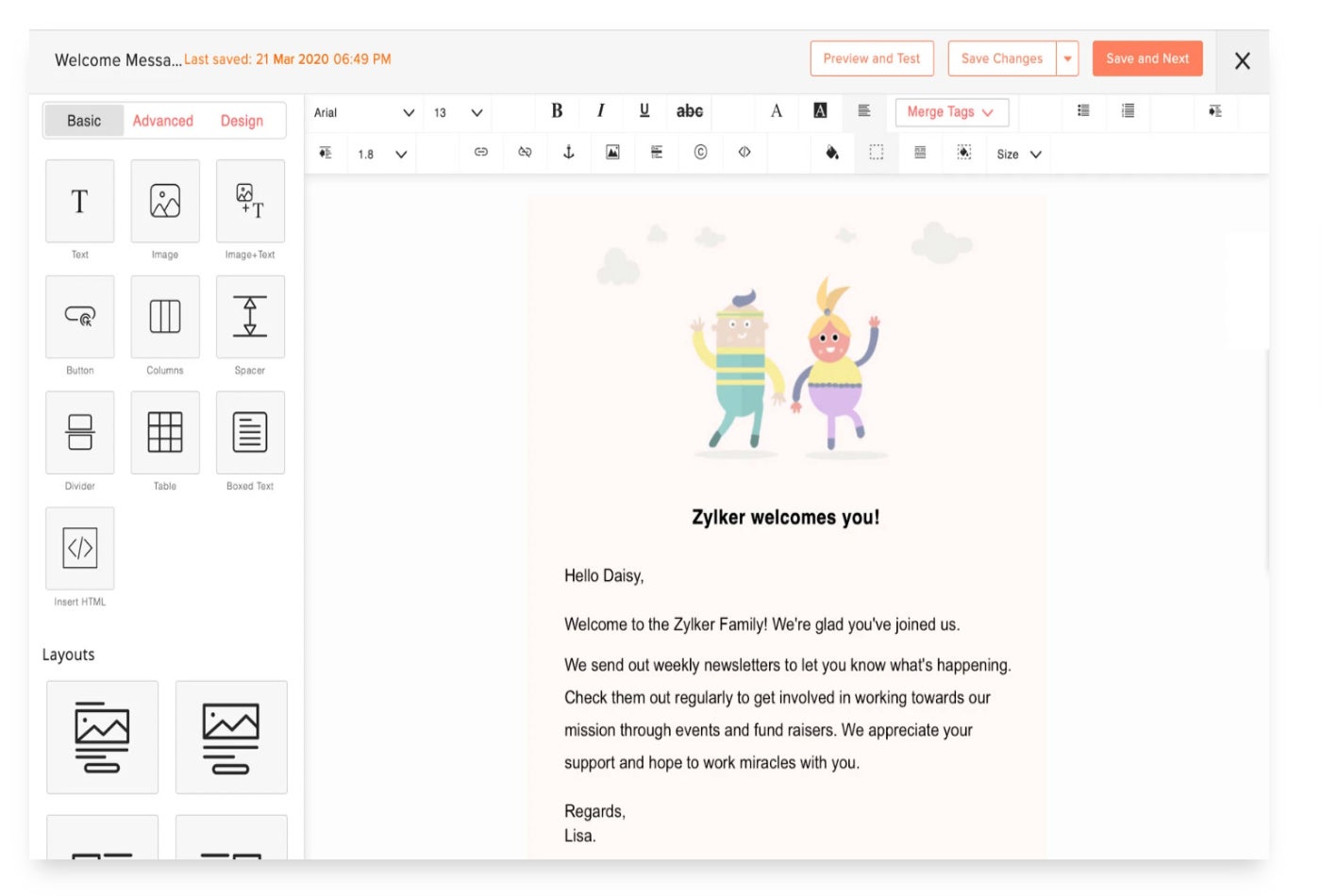 Figure B: Sample email template with Zoho CRM email builder. Image: Zoho CRM
Figure B: Sample email template with Zoho CRM email builder. Image: Zoho CRM
Zoho CRM pros and cons
| Pros | Cons |
|---|---|
| 15-day free trial. | Users report poor platform tutorials and resources. |
| Robust social media integrations and campaigns. | Requires some customizations and onboarding before the tool is usable. |
| 30-day money-back guarantee. | Users can only access AI tools through top premium plans. |
Why we chose Zoho CRM
Zoho CRM offers end-to-end solutions that cover marketing, sales and customer support. Its marketing features make it a standout option for nonprofits looking to invest in their brand visibility. Zoho CRM’s top premium tiers grant access to its AI-powered tools such as Zia assistant. Together, these tools can grow a nonprofit’s outreach and manage the influx of donors with engagement strategies.
Zoho CRM’s free tier and ideal use case of omnichannel marketing make it a great option for growing nonprofits in emerging markets. If your organization already has a steady marketing strategy and you’re in need of a solution with donor reports and behavioral tracking, check out Virtuous for its industry-specific donor management tools.
Interested in knowing more about Zoho? Read our Zoho CRM review.
Virtuous: Best for tracking donor behavior with data insights
Our star rating: 4.1/5
 Image: Virtuous
Image: Virtuous
Virtuous offers organizations a single donor view through the dashboard — this way, users know who to contact and what to tackle. This view offers intelligent suggestions for the next best action based on the donor’s gift history, social network behaviors, wealth data, demographic data and more. Virtuous offers nonprofit-specific metric tracking that can give your employees the power to make data-backed decisions regarding donor activity and engagement.
Pricing
- Starter: Contact for a quote. Best for businesses with under 5,000 contacts. Supports up to five users and comes with four automation workflows.
- Platform: Contact for a quote. This plan supports unlimited users, unlimited workflows and up to 25,000 emails per month.
- Enterprise: Contact for a quote. This plan supports unlimited users and can manage between 30,000 and millions of contacts with open API, custom integrations and third-party reports.
Features
- Gift and pipeline management: View donor gift history directly through the tool with a specific dashboard with filters around portfolios, fundraisers and activity.
- Fundraising insights: Get intelligent suggestions for the next best action or suggested gift asks based on gift history, social media behavior, wealth data and more.
- Project tracking: Sync donations to specific projects to trigger automatic follow up with donors using project-level impact notes.
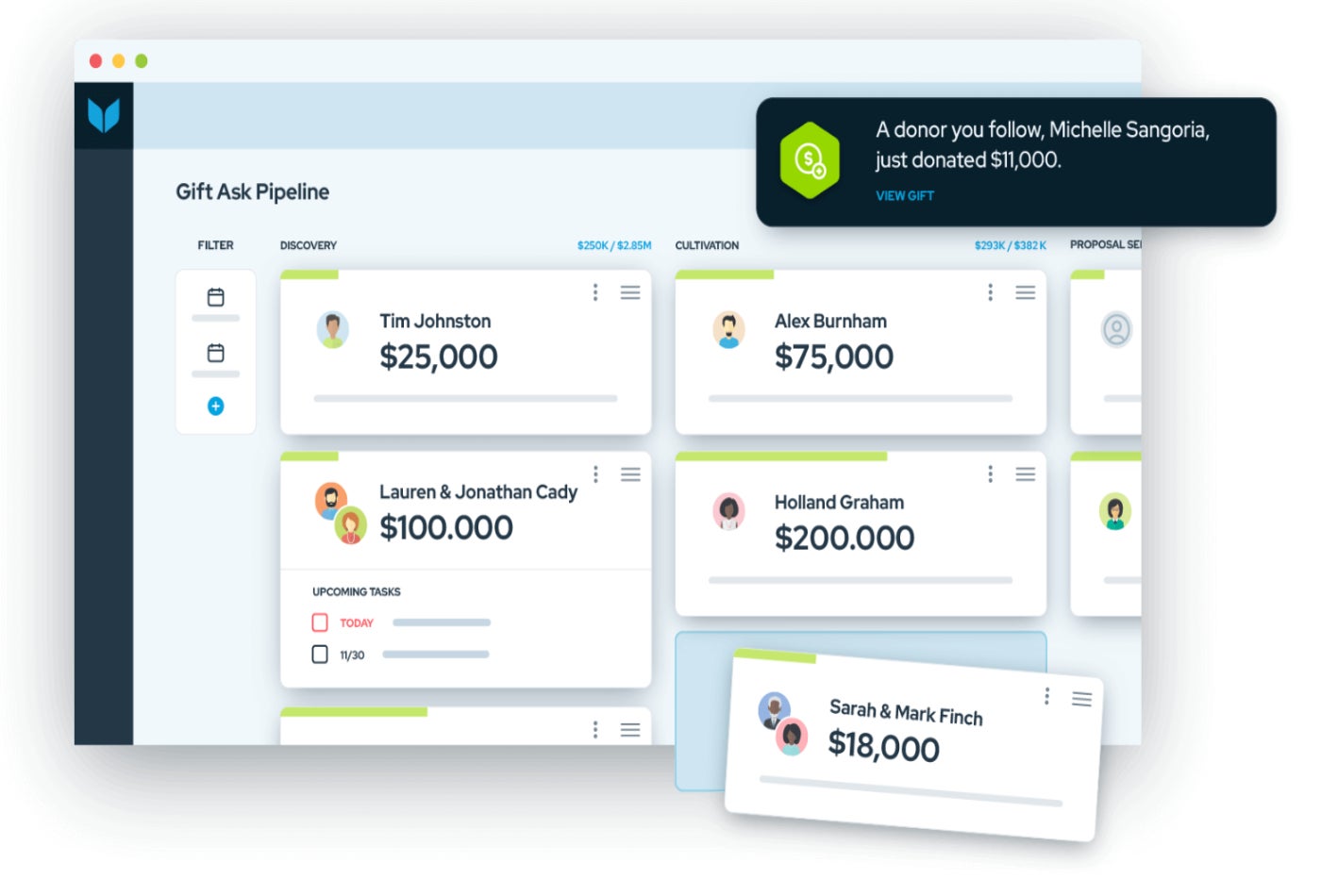 Figure C: Example gift ask pipeline dashboard. Image: Virtuous
Figure C: Example gift ask pipeline dashboard. Image: Virtuous
Virtuous pros and cons
| Pros | Cons |
|---|---|
| Offers a live product tour, self-guided tour and a one-on-one demo. | No upfront pricing. |
| Users praise quick onboarding and training resources. | Users report occasional delays with data importing or exporting. |
| Users report consistent roll-out of upgrades, bug fixes and new features. | Users report limitations around marketing tools and content personalization. |
Why we chose Virtuous
Virtuous is a full-scale solution for nonprofits looking for a donor, fundraising, volunteer and marketing platform. The tools help nonprofits of different sizes recruit and mobilize volunteers to fill mission-critical needs. Users report how Virtuous doesn’t require much upfront investment of time or manpower to get it implemented into a nonprofit’s processes, which is a major bonus for nonprofits that might lack those two key things.
Because Virtuous doesn’t disclose its pricing upfront, it’s tough to say how scalable and affordable the platform is for small nonprofits. If you’re in need of a solution with a multitude of premium plans to choose from, along with all the key management donor or volunteer features, check out Pipedrive.
Features
- Live chat software: Connect this feature to your organization’s website to convert new donors in real time.
- Meeting scheduler: Schedule meetings quickly by eliminating back-and-forth emails and allowing donors to book a meeting time that works for everyone.
- Deal pipeline: Assign tasks to team members or volunteers within a deal pipeline where users can track performance.
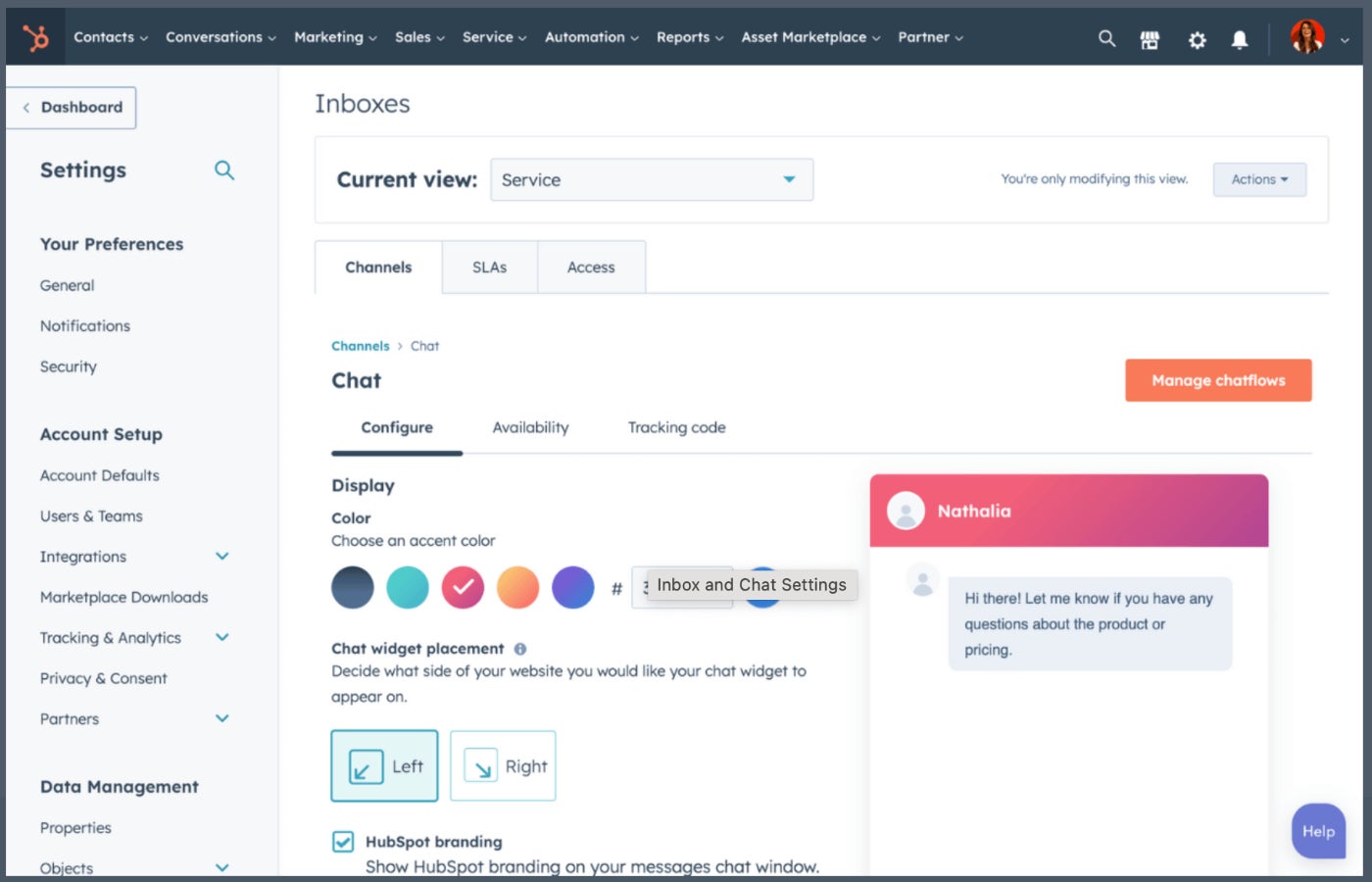 Figure D: HubSpot website live chat builder. Image: HubSpot
Figure D: HubSpot website live chat builder. Image: HubSpot
HubSpot pros and cons
| Pros | Cons |
|---|---|
| Provides free demos and product walkthroughs. | Premium and enterprise level plans can be pricey. |
| Users report an intuitive interface. | Community support isn’t available in the free tier. |
| Advanced AI functionality. | Users report limited field customizations. |
Why we chose HubSpot
HubSpot is a popular CRM provider that has landed as a front runner on our guide to the top free CRM. It’s a powerful platform with additional solutions for marketing, service, content, operations and commerce. The free version uniquely offers up to 2,500 users, making it an extremely scalable tool. HubSpot has the capability to house all donor information for startups, SMBs and even enterprise-sized organizations.
Though HubSpot’s free version is robust, there are still some limitations, especially with AI tools. And the premium versions of the HubSpot platform can be costly compared to others on this list. Because of this, if you’re wanting an option with more affordable pricing tiers, look into Pipedrive or Zoho CRM.
Want to know more? Head over to our detailed HubSpot review.
Bitrix24: Best white label CRM for nonprofits
Our star rating: 4.1/5
 Image: Bitrix24
Image: Bitrix24
Bitrix24 CRM software can be ready to use in 30 seconds, right after an organization registers an account at Bitrix24.com. From there, nonprofits can adapt the tool as a white label provider, meaning it can be totally customized to fit the brand of the organization. That brand can be visible across social networks, file sharing, calendars and scheduling and more.
Pricing
- Free: Unlimited users and 5 GB of storage with limited access to features like collaboration, website builder and other core CRM tools.
- Basic: $49 per organization per month, billed annually, or $61 per organization when billed monthly for five users. This tier offers everything in the free tier, plus more task and project features and customer support.
- Standard: $99 per organization per month, billed annually, or $124 per organization when billed monthly for 50 users. This includes everything in the Basic tier, plus video calls, CRM analytics and more.
- Professional: $199 per organization per month, billed annually, or $249 per organization when billed monthly for 100 users. This tier offers advanced business process automations and more.
- Enterprise: $399 per organization per month, billed annually, or $499 per organization when billed monthly, for 250 users. This tier offers full support for HR, scalability, administration tools and more.
Features
- Mobile app: Create invoices through the mobile app quickly with just one tap, and integrate with payments and e-invoicing to help fundraise in the field.
- Volunteer coordination: Utilize social media to target volunteers, share and sync calendars, manage sign-up documents and waivers, and more.
- Workflow automation: Automate processes with rules and triggers to streamline requests and approvals with no-code RPA.
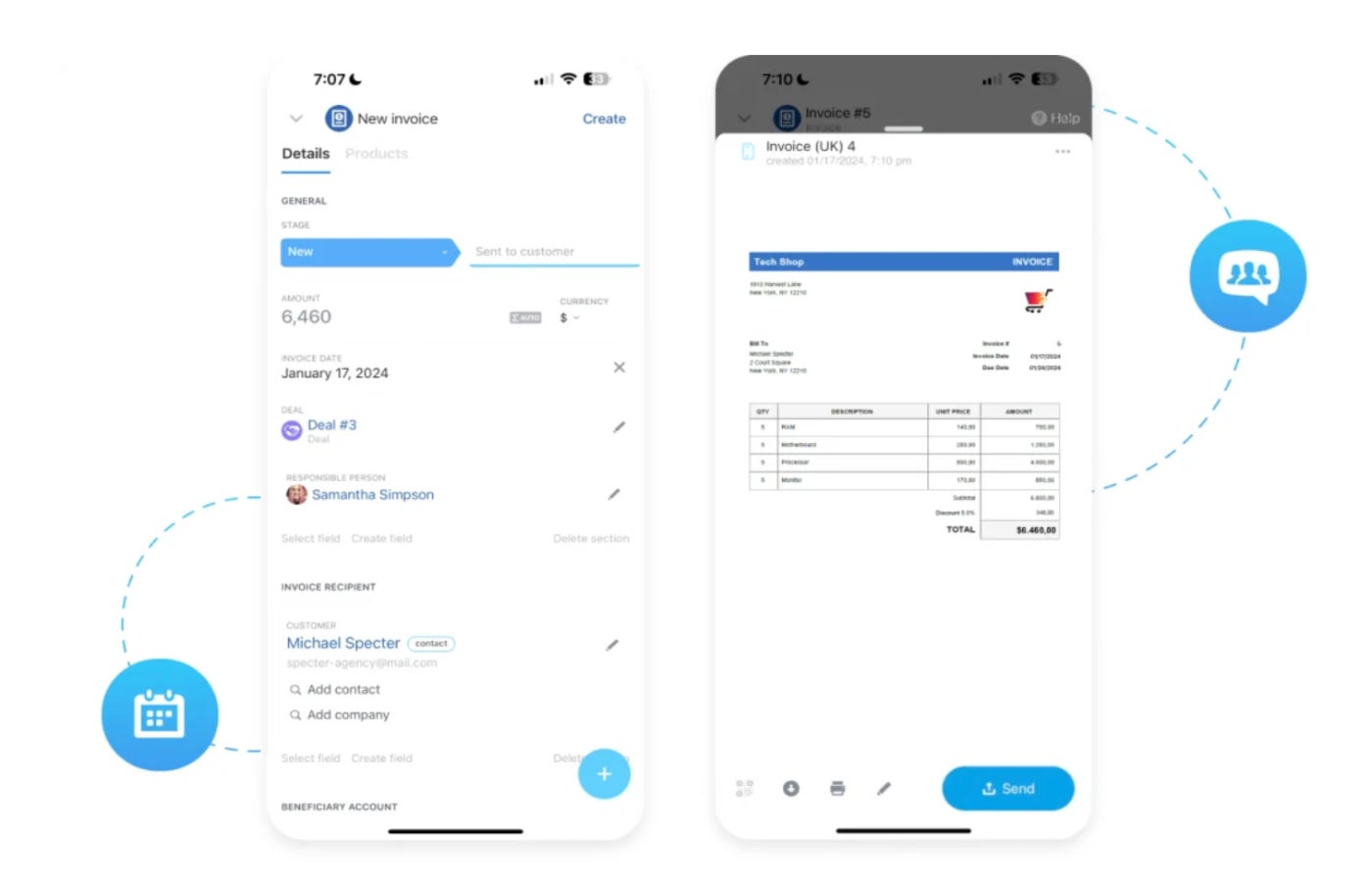 Figure E: Bitrix24 mobile app invoicing feature. Image: Bitrix24
Figure E: Bitrix24 mobile app invoicing feature. Image: Bitrix24
Bitrix24 pros and cons
| Pros | Cons |
|---|---|
| 15-day free trial. | User reports of limited reporting features. |
| Provides training courses and online resources for users. | User reports of a steep platform learning curve. |
| Users praise internal collaboration tools. | Add-on features can be costly. |
Why we chose Bitrix24
Bitrix24 markets itself as an online workspace, with a CRM platform being the core solution. The CRM product is highly versatile with easy administration and users can join via an email link. The tool can uniquely house data in the cloud or on-premises, depending on the organization’s preference. Bitrix24 can be customized with API and source code available for on-premises editions.
Bitrix24 offers plenty of resources for onboarding and implementing their tool, along with a unique pricing structure that is per organization with user caps rather than per user. But if you’re looking for a similar option with specialization in nonprofit donor management, look into Virtuous.
monday sales CRM: Best for nonprofit project management
Our star rating: 3.5/5
 Image: monday sales CRM
Image: monday sales CRM
monday sales CRM offers nonprofit organizations all the tools to track and manage ongoing and upcoming projects. The detailed dashboards give organizations high-level visibility that instantly reports donation progress, fundraising figures and team performance.
Users can access all team activities, like calls and meetings, in one place to track performance, understand their capacity, and plan ahead. This helps manage any team’s quota attainment, track wins and view goals for specific members or the entire team. With no-code automations, organizations can let the platform do the mundane tasks.
Pricing
- Free version: monday.com offers a nonprofit discount only for monday work management. It doesn’t yet offer nonprofit discounts for the monday dev or monday sales CRM products.
- Basic CRM: $12 per user per month, billed annually, or $15 per user when billed monthly. This tier offers unlimited pipelines, boards and contacts, as well as templates for lead, contact and deal management.
- Standard CRM: $17 per user per month, billed annually, or $20 per user when billed monthly. This includes advanced account, contact and deal management, two-way email integration with Gmail and Outlook, and an AI email generator.
- Pro CRM: $28 per user per month, billed annually, or $33 per user when billed monthly. This tier includes sales forecasting, email templates with custom parameters, mass emails and added integrations.
- Enterprise CRM: Contact monday.com for a quote. This level of support offers lead scoring, team goals and advanced analytics.
Features
- Dashboards and reporting: Create advanced reporting on pipelines so organizations can get big-picture views as well as detailed drill-downs.
- Team goals: Manage each team’s quota attainment over time, track major wins and view goals for individuals.
- Call logging: Log all calls with donors, volunteers or community members with automatic summary screens that suggest prebuilt quick responses.
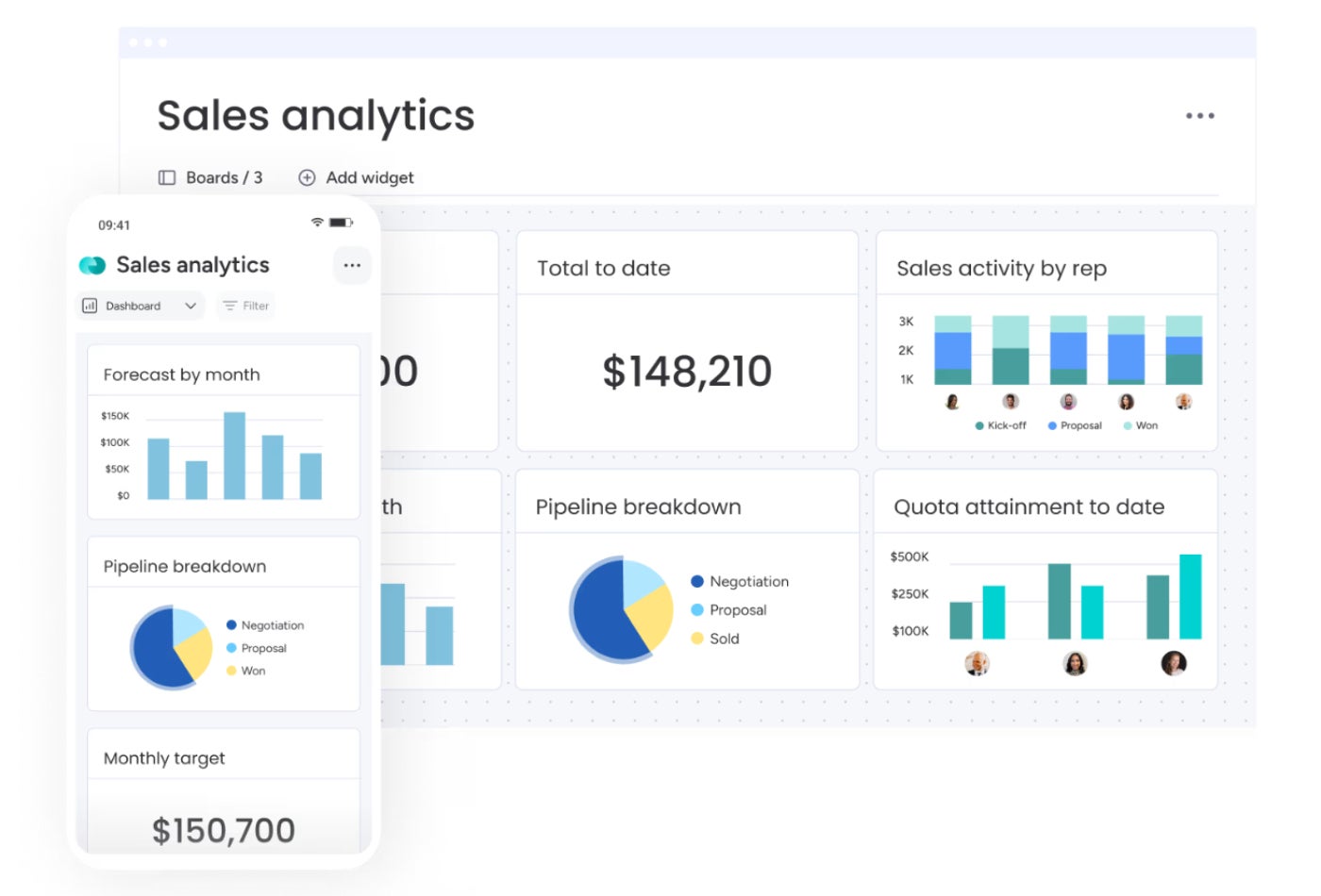 Figure F: Sample sales reporting dashboard. Image: monday sales CRM
Figure F: Sample sales reporting dashboard. Image: monday sales CRM
monday sales CRM pros and cons
| Pros | Cons |
|---|---|
| 14-day free trial. | The nonprofit discount doesn’t yet apply to the sales CRM solution. |
| Users praise the platform’s ability to segment data into comprehensive dashboards. | Lead/donor scoring is only available for the highest-paid tier. |
| Unlimited contacts. | Users report inconsistencies with Gmail integration. |
Why we chose monday sales CRM
Monday sales CRM is flexible CRM software that can manage entire sales processes from lead or donor generation to fundraising. monday sales CRM allows for robust automations with no coding background. This makes it an intuitive option for nonprofits that might not have the manpower to set up the backend of a platform.
While monday sales CRM is powerful, only its WorkOS for nonprofits plan offers an easy-to-use, discounted nonprofit platform to eligible organizations. If your organization is wanting a feature-rich tool at a similar price or even lower, consider HubSpot or Pipedrive.
Read our independent monday sales CRM review for more information.
Must-read big data coverage
How do I choose the best nonprofit CRM software for my organization?
With this detailed list of the top CRM providers for nonprofits, it’s now time to begin contacting those that seem to fit your organization’s needs best. Consider requesting demos, sign up for free trials or begin communicating with the sales team to learn more. This will give you a better idea of what an onboarding and implementation process would look like, plus an opportunity to ask any preliminary questions.
Here are some sample questions to consider asking when choosing nonprofit CRM software:
- Does the tool offer in-market expertise for the nonprofit industry?
- Does the software fit your organization’s budget? Would a free CRM tool be a better option?
- Does the tool integrate with tools and applications you already have in your tech stack?
- Is the CRM tool scalable and detailed enough to fit your small business or enterprise?
- Does the CRM tool have any open-source functionality that requires coding or development expertise?
FORUM: Here are some factors to consider when choosing a CRM.
Review methodology
To evaluate the top nonprofit CRM software, I used an in-house rubric with outlined criteria with a special focus on functionality that specifically caters to the needs of nonprofit organizations. After scoring and then reviewing each provider listed above with the rubric, an algorithm calculated an overall star rating, which I used to assign each an ideal use case. That start rating is on a scale of one to five.
Here are the exact scoring criteria and weight scale I used:
- Cost: Weighted 25% of the total score.
- Core features: Weighted 25% of the total score.
- Customizations: Weighted 15% of the total score.
- Integrations: Weighted 15% of the total score.
- Ease of use: Weighted 10% of the total score.
- Customer support: Weighted 10% of the total score.
